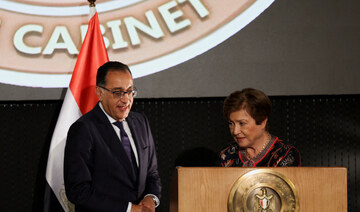RIYADH: Lower food prices helped ease Egypt’s inflation rate, which rose by 1.5 percent in October, down from the 2.3 percent increase recorded in September, according to official data.
The Central Agency for Public Mobilization and Statistics said the general consumer price index reached 240 points last month, reflecting the modest decline in inflationary pressures.
The easing was primarily driven by a 2.1 percent decrease in fruit prices and a 0.4 percent decline in vegetable and hotel services prices, which helped mitigate cost increases in other sectors.
On an annual basis, Egypt’s inflation rate dropped to 26.3 percent in October, a sharp decline from the 38.5 percent reported in the same month of the previous year, signaling a cooling trend in price pressures.
This comes as Egypt has been grappling with high inflation in recent years, driven by a mix of global economic pressures, currency devaluation, and rising import costs, which have led to persistent price increases, particularly in essential goods and services, straining household budgets and impacting consumer spending.
While some categories saw price reductions, others continued to exert upward pressure. Meat and poultry prices surged 3.3 percent, while fish and seafood prices climbed 2.1 percent.
Dairy products, including cheese and eggs, rose by 2 percent, while sugar, tea, and cocoa recorded a 1.2 percent increase. Bottled water and natural juices increased by 1.1 percent, and cereal and bread prices rose by 0.8 percent.
Energy costs remained a key factor, with a 7.2 percent increase in electricity, gas, and fuel prices. Housing maintenance expenses rose by 1.5 percent, while rent increased by 0.7 percent.
Medical services also contributed to the inflationary trend, with outpatient services up 2.4 percent and hospital services increasing by 1.7 percent.
Food and beverage prices saw an annual increase of 26.9 percent, driven by sharp rises across several key categories.
Grains and bread prices surged by 36.7 percent, while meat and poultry climbed 19.7 percent. Fish and seafood rose by 21.9 percent, and dairy products, including cheese and eggs, jumped 29.9 percent. Oils and fats increased by 14.9 percent, and fruits were up 28.5 percent.
The vegetable category saw one of the largest hikes, rising by 39.1 percent. Sugar and sugary foods increased by 15.2 percent, while tea, coffee, and cocoa prices grew by 28.1 percent. Bottled water, soft drinks, and natural juices recorded a rise of 39.2 percent.
Alcoholic beverages and tobacco prices rose by 35.1 percent annually, with alcoholic drinks up by 16.1 percent and tobacco products increasing by 35.1 percent.
Clothing and footwear prices increased by 24.4 percent, driven by a 31.9 percent rise in textiles, a 24.9 percent increase in ready-made garments, a 29.9 percent rise in other clothing items, and a 21.1 percent increase in footwear.
Housing, water, electricity, gas, and fuel costs rose by 20.3 percent. Actual rent prices were up 8.6 percent, housing maintenance costs increased by 16.7 percent, water and miscellaneous housing services rose by 20.5 percent, and electricity, gas, and other fuel prices surged by 44.9 percent.
The furniture, household equipment, and maintenance sector saw a 24 percent annual increase, driven by a 22.0 percent rise in furniture and carpeting, a 28.2 percent increase in household furnishings, a 28 percent rise in household appliances, a 31.4 percent increase in garden tools and equipment, and a 22.5 percent rise in household maintenance goods and services.
Healthcare costs jumped 31.3 percent, primarily due to a 40.6 percent increase in medical products and equipment, a 17.8 percent rise in outpatient services, and a 22.1 percent increase in hospital services.
The transportation sector recorded a 30.2 percent increase, influenced by a 24.5 percent rise in vehicle purchases, a 28.7 percent increase in private transportation expenses, and a 32 percent rise in transportation services.
Communication services rose by 12.6 percent, with postal services prices soaring by 60 percent, telephone and fax equipment prices increasing by 27.8 percent, and telephone and fax service costs rising by 11.4 percent.
In a separate development, the Central Bank of Egypt announced that it will issue a one-year treasury bill auction worth $1.5 billion on Oct. 12.
Acting on behalf of the Egyptian Ministry of Finance, the CBE will manage the reissuance of foreign currency-denominated treasury bills — either in euros or US dollars — to investors from domestic banks, as the maturity date of previously issued bills approaches.


























